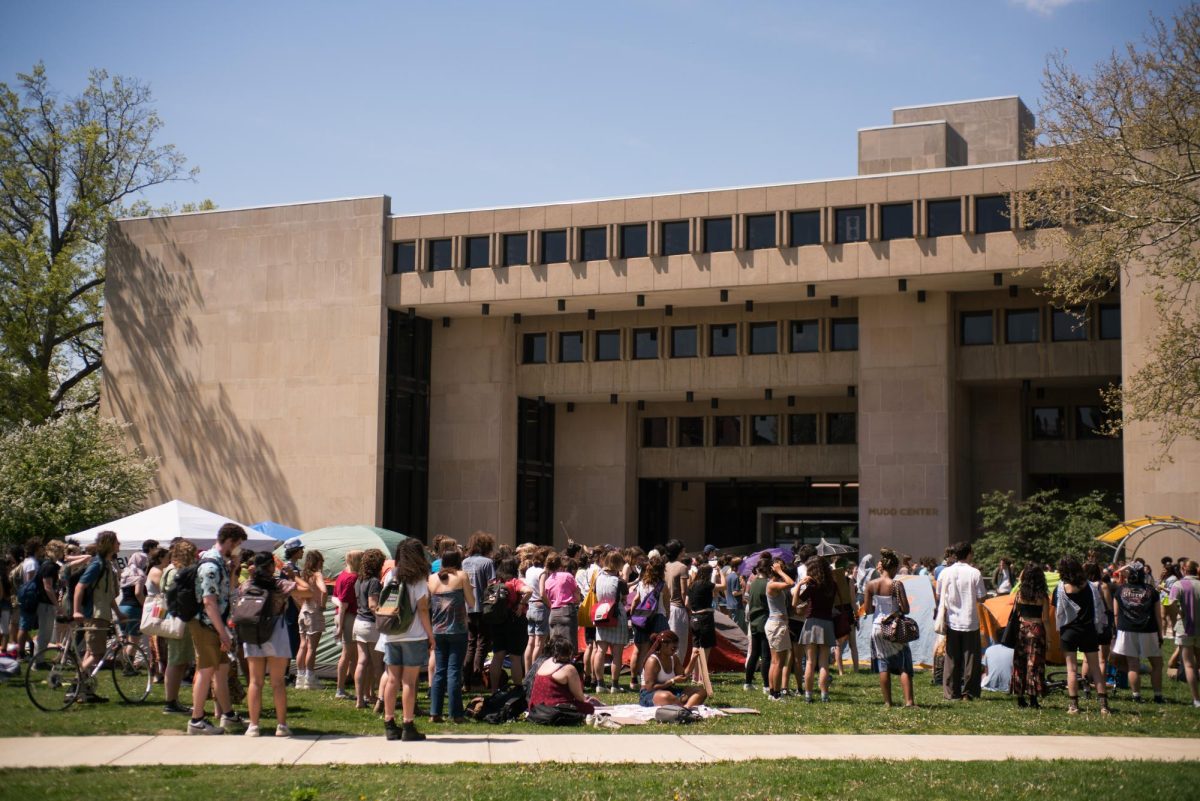Editors’ Note: SB 104 requires that the College post gendered signage on every multi-use bathroom on campus, and that it cannot knowingly allow students to use a bathroom that does not correlate with their sex assigned at birth. However, the law does not contain language indicating any explicit enforcement mechanism.
These interviews have ben edited for length and clarity.
What are your thoughts on Ohio’s bathroom bill and Oberlin’s decision to accommodate the law and whether or not you think students can or should try to mobilize to pressure the administration not to follow the law?
Lila Sanchez, College fourth-year:
I think the bathroom bill is stupid. It’s obviously just trying to push the country’s right-wing agenda. I don’t think the College is going to not follow the law. It’s a private institution. It is a corporation; it’s a company at the end of the day. They’re just simply not gonna do something that’s illegal because then they would lose any form of federal funding or support. I think students can mobilize if they want to. Personally, I feel like no one really takes the bathroom signs that seriously in the first place. I don’t think it really matters which bathroom you walk into. I do feel like the ripping of the signs causes more work for facility staff, but also, I guess that is the College requiring them to keep putting it up. So, I don’t know. I support any student effort of mobilization, but I just don’t think that the College is gonna do anything, so they might as well just use whatever bathroom they want and ignore the law, because the College already said there is no way to enforce the law.
Dylan Kim, College second-year:
I mean, obviously it’s a pretty present issue that students are very upset with. I will say that the administration is definitely supportive in a sense. I mean, they aren’t enforcing the bathroom rules, they’re just kind of adhering to the laws made by stupid legislators. But it definitely is an issue. If we were to protest, I think we’d be mobilizing against the centralized government in Ohio, like specifically the legislative government in Ohio, rather than the College. A lot of students are kind of leaning toward protesting against the administration, when I don’t think the administration holds a lot of power over that. But definitely, Oberlin could kind of stand up and have a voice in the state conversation. But, it’s almost like it transcends a campus issue.
It’s very much a national issue that requires a lot more mobilization than Oberlin students. But Oberlin students, I feel, could play a very big role in that, a key factor in making change as Oberlin students always are. For example, creating a student organization to kind of help with mobilizing and protesting, organizing students. So hopefully there will be greater change in the future. But I’m still grateful that the administration is not enforcing the law, even though its a law that obviously makes some students uncomfortable, ’cause it’s a label.
Juwayria Zahurullah, College third-year:
My belief is that Oberlin’s administration has not done their due diligence in making it clear to their student body that they intend to protect the identities and freedoms of all students on campus. And I believe the reason for that is because Oberlin, culturally, has done a good job of creating an environment that is safe for students to express themselves in a lot of ways that they might not be as supported to do on other college campuses. I think that in the eyes of the Oberlin administration, they may view that overall campus culture as enough to make up for no formal acknowledgement of their intention to protect students. I think that’s really shameful, you know, that we can claim to have this community and environment of safety for all of our students, but when it comes to things that are on paper or things that are in the public eye, that put the College in the public eye, that in those cases they will prioritize looking politically correct or trying to look correct on paper rather than reinforcing the culture and community that they claim to build for students.
I would definitely not say it’s out of the students’ hands. I would say, if anything, students have the ultimate control over how their institution is seen in the public eye. And if we don’t like the fact that our administration is being very cookie-cutter about this clearly bigoted, biased law that’s being presented to schools, it is the responsibility of students to reclaim what we believe our institution stands for in that sense. As to the actual right ways to do that, I don’t know, and I don’t think there really is a right way, but I think the ways that students have just been very open about their frustrations with the institution currently and starting more conversations about it and making it more of like a public issue is definitely a big first step in what that organizing could look like. So in terms of that, I have faith in our student body that they will make their voices heard in this case, and not let the administration or their tendencies to want to come across politically correct or media-friendly get in the way of that or whatever. I don’t think that students will just succumb to that in any way and by any means.
What are your thoughts on federal agencies responding to Trump’s anti-DEI executive orders about no longer observing cultural awareness holidays like Martin Luther King, Jr. Day, Pride Month, and Juneteenth?
Madisyn Burke, College second-year:
We have students who are super liberal, but you would also think that the staff would hold space for some sort of resistance, and they have the power to do so. I think Trump being in office is honestly like America’s way of trying to erase history. And how do you erase history? You erase knowledge and those months provide knowledge. And that’s the knowledge that Black kids grow up with. Books are getting banned. You know, there’s so much stuff and schools are getting blocked off, textbooks, and it’s just crazy. But it’s expected.
Manon Reagans, College third-year:
I think the dismissal of the significant Black holidays speaks a lot to white supremacy and just how Donald Trump seeks to cut ties with the kind of cohesiveness of the culture that a lot of Americans are trying to shift toward. I think it’s destructive for our country, you know? Dismissing Black History Month is dismissing who built the country. I feel that this is a step back.
What are your feelings surrounding Trump’s executive order banning pro-Palestine protests to quote “combat antisemitism?” Follow–up question: as Oberlin is an institution with a history of activism, how do you feel this will affect us moving forward?
Juwayria Zahurullah:
I think international students have always known that there was a target on their backs, but this is really an insane step in limiting freedom of speech. I think it really just speaks more to the attempts to take away academic discourse in this country, and to shut down academia and defund education. It’s like a larger pattern. Specifically, you know, how it relates to Oberlin. I think the more that we can protect our groups of vulnerable students, the better. That extends to Trump’s attempts to shut down DEI initiatives, how that affects our diverse students here and students that are otherwise under scrutiny under the current administration. What can we do to protect those students? At our core as a liberal arts college, a place that encourages this type of academic discourse, what are we doing to protect that?
How do you think students can try to rally as a social safety net for international students, specifically who have been protesting for Palestine?
Juwayria Zahurullah:
I think just practicing the same means of community care that I think Oberlin students have become really good and intentional about: making sure that you’re not sharing things on social media without people’s permission, being very intentional about what you share on social media in general, but also, especially if you’re a student that has citizenship or permanent status in the country, using that position of privilege to protect students.











